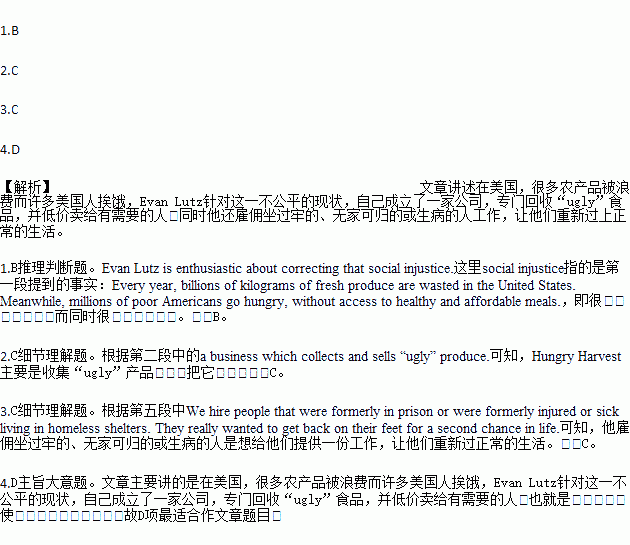题目内容
Every year, billions of kilograms of fresh produce are wasted in the United States. Meanwhile, millions of poor Americans go hungry, without access to healthy and affordable meals.
Evan Lutz is enthusiastic about correcting that social injustice. And he combines that goal with enthusiasm for business, Lutz is CEO and founder of Hungry Harvest, a business which collects and sells “ugly” produce. These are fruits and vegetables that most food companies would throw away. More than six billion pounds are wasted each year due to surface imperfections.
“So I’ll give you an example.” Lutz says, “If you go to a grocery store you will see all the produce lineup shiny, perfect, of the same size and color. But on a farm, everything doesn’t grow the same way. So all that stuff that doesn’t grow the same way often gets thrown out. And what we do is take all that normally gets thrown out because of its odd size or shape, box it up and deliver it to our customers once a week.”
For Evan Lutz, giving back to others came from his upbringing.
“When I was growing up my parents taught me the values of giving back, and giving is a lot more powerful than receiving. We sell produce with a purpose and that doesn’t just mean we reduce food from going to waste. We hire people that were formerly in prison or were formerly injured or sick living in homeless shelters. They really wanted to get back on their feet for a second chance in life.”
Evan Lutz is really happy to be realizing great mission that he thinks can really revolutionize the food industry in America.
1.The social injustice in Paragraph 2 refers to the fact that ________.
A. vegetables and fruits that don’t taste good get wasted
B. much produce gets wasted while many Americans starve
C. grocery stores only sell produce of the same size
D. poor Americans cannot afford healthy food
2.What business does Hungry Harvest mainly do?
A. Deliver food for free.
B. Raise money for the poor.
C. Collect “ugly” produce and sell it.
D. Buy “ugly” produce and process it.
3.Why does Evan Lutz hire those people mentioned in Paragraph 5?
A. To lower labor costs. B. To increase productivity.
C. To offer them a job. D. To enjoy a better reputation.
4.What can be a suitable title for the passage?
A. Creating More Jobs for the Less Fortunate
B. Putting Healthy Food on Dinner Table
C. Making Profits from Shiny Produce
D. Giving Unused Produce a Purpose

